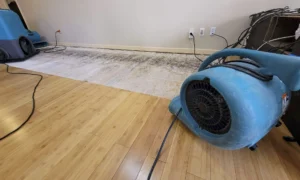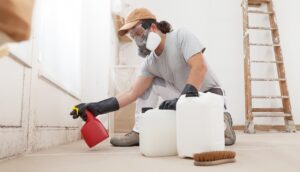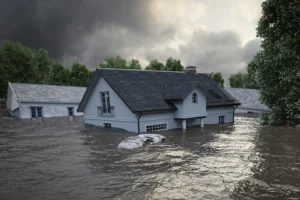Frozen pipes are more than an inconvenience; they can lead to serious problems in your home. When water freezes inside pipes, it expands. This expansion puts pressure on the pipe, creating cracks or even causing it to burst. These breaks can result in significant water damage, which might go unnoticed until it causes widespread destruction.
When pipes freeze, they disrupt your water supply. No water for drinking, cooking, or bathing can make daily life difficult. Frozen pipes can lead to hidden problems too, like mold growth, which poses health risks. Mold loves damp environments and can grow quickly after a pipe bursts.
Ignoring frozen pipes can also result in long-term structural damage to your house. Water from a burst pipe can weaken walls, floors, and ceilings. It can even seep down into your foundation, leading to costly repairs. Preventing pipes from freezing should be a top priority for any homeowner. Simple steps can make a big difference, and knowing when to call in professionals is vital. Taking action early can save you time, money, and stress.
Understanding Frozen Pipes and Their Causes
Understanding why pipes freeze helps in preventing serious water damage. Pipes freeze when the temperature drops below 32 degrees Fahrenheit, causing the water inside to turn into ice. As water freezes, it expands, pushing against the walls of the pipe. If the pressure becomes too great, the pipe can crack or burst, leading to leaks once the ice starts to thaw.
Certain parts of the home are more prone to pipe freezing. These include:
1. Exterior Walls: Pipes that run along outside walls have less insulation, making them more exposed to cold.
2. Basements and Crawl Spaces: These areas are often unheated or poorly insulated, allowing temperatures to plummet.
3. Attics and Garages: Pipes in these sections are also at risk because these spaces are typically not kept warm.
4. Under Sinks and Cabinets: Lack of air circulation in these spots can cause pipes to get very cold.
By being aware of these spots, homeowners can take steps to insulate and protect their pipes from freezing temperatures.
Immediate Effects of Frozen Pipes
Frozen pipes cause immediate disruptions in daily life, the biggest being the interruption of your water supply. Suddenly, turning on the tap yields only a trickle or no water at all. This lack of water creates inconvenience, affecting basic activities like cooking, cleaning, and personal hygiene.
There are noticeable signs that point to frozen pipes:
1. Frost on Pipes: Visible frost or ice accumulation on exposed pipes is a clear indicator that freezing is occurring.
2. Strange Noises: Hearing banging or gurgling sounds can suggest that water is struggling to pass through narrow ice blockages.
3. Bulging Pipes: Pipes that appear swollen or have tiny cracks may be in the process of freezing.
Recognizing these early signs helps to act quickly before the situation worsens. Addressing frozen pipes early prevents more serious damage like bursting, saving time and costly repairs later. Keeping a close watch during cold weather is essential to maintaining a functional and safe plumbing system.
Long-Term Damage from Ignoring Frozen Pipes
Ignoring frozen pipes can lead to severe long-term consequences. One major issue is structural damage caused by burst pipes. When a pipe bursts, the released water can flood your home. This flooding can weaken walls, floors, and even the foundation. The structural integrity of your house might be compromised, leading to costly repairs and possibly unsafe living conditions.
Mold growth is another serious problem resulting from burst pipes. Mold thrives in moist environments, so any damp areas caused by leaks become breeding grounds. Mold not only damages surfaces but also poses health risks. It can trigger allergies, respiratory problems, and other health issues, especially in children and the elderly. In addition, water contamination can occur if the water from the burst pipe mixes with dirt or mold, leading to unhealthy living conditions.
Preventing these long-term damages requires prompt action at the first sign of frozen pipes. Catching the problem early can save you from these expensive and dangerous outcomes, protecting both your home and your health.
Preventative Measures and Professional Restoration
Taking action to prevent your pipes from freezing can save you from a lot of trouble. Simple steps can make a big difference. Here are some effective measures:
1. Insulate Pipes: Use pipe insulation for those in unheated areas like basements, attics, and garages.
2. Seal Gaps: Close up any gaps around pipes that let in cold air. Use caulk or insulation.
3. Let Faucets Drip: Allow a small trickle of water to flow through the pipes during extreme cold. Moving water is less likely to freeze.
4. Open Cabinet Doors: This helps warm air circulate around pipes under sinks and in other enclosed areas.
Professional assessment and restoration are crucial if you suspect or find frozen pipes. Experts can identify areas at high risk and apply advanced techniques to protect your home. Any damage caused by frozen pipes should also be left to professionals to repair. They have the necessary tools and experience to ensure the repairs are thorough and effective, preventing further issues down the line.
Conclusion
Dealing with frozen pipes might seem like just another winter hassle, but the consequences of ignoring them can be costly. Recognizing the signs and taking swift action to prevent or address frozen pipes will save you from major headaches. From structural damage to mold growth, the risks are real and serious. Ensuring your home’s plumbing is prepared for cold weather protects your comfort and safety.
For those in Mukilteo, WA, who need help with frozen pipes or are in need of damage restoration services, Northwest Restoration is here to assist. Our professional team has the expertise to prevent future problems and restore any damage. Contact us today to keep your home protected and in good condition throughout the year.









